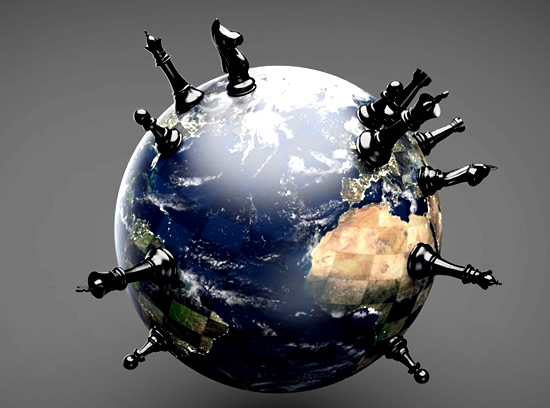Many interpretations of international conflict share common assumptions regarding the default oppositional nature of states or cultures. According to Realism, the predominant theory of International Relations, conflict arises inevitably, and is a natural outcome of a highly competitive international environment. It is also a reflection, and extension, of the competitive, selfish and power driven nature of man. In a larger sense, “man” can refer both to individuals and to larger communities (or tribes, in ancient times) that one belongs to and toward which one feels protective – by virtue of sharing an in-group identity.
For some thinkers, including some Realists, the origin of this perpetual conflictual mode can be traced to irreconcilable cultural differences. Samuel Huntington’s well-known “clash of civilizations” theory, while notable for implicating culture more deeply in geo-political power relations, nonetheless essentially maintains the commitments of traditional Realism. States continue to be the primary actors in an anarchical system with scarce resources and where self-help is required for survival, but cultural fault lines – arising from civilizational differences – rather than ideological or economic issues are posited as the dominant source of conflict in global politics. Huntington furthermore contends that cultural differences are more constant and thus less easily compromised and resolved than political and economic ones.
The debate on strategic culture in international relations has emphasized divisiveness along similar lines. It is hard to argue against the fact that countries are influenced in their strategic thinking and security policies by historical narratives of their respective national ‘cultures’, which have sources in history, a shared sense of identity, folklore and cultural heritage. For example, it is erroneous to say that China, the US, Israel or Japan, think and act in their security policies solely based on “rational” calculations. China’s strategic culture is deeply influenced by its history and culture, and among others, by the legacy of its “century of humiliation”, Resilience, the teachings of Sun Tzu, and Confucianism. The US too has a distinct understanding of its role in the world, its sense of exceptionalism and commitment to the values of democracy and freedom. Israel’s policies are profoundly influenced by an emotional and insecure view of its history. Examples could go on. Culture does permeate national strategy but the problem remains that the very notion of what constitutes ‘culture’ is often taken for granted, as a matter-of-fact assumption that it is something that developed intrinsically.
This kind of adversarial characterization of relations between states, whether framed in national or civilizational terms, misconstrues cultures and civilizations as insulated, isolated, monolithic entities, undervalues historical cultural sharing, and overemphasizes the conflictual nature of the international system. As Edward Said argued in the wake of the 9/11 attacks in his 2003 preface to his seminal work, Orientalism, “the terrible conflicts that herd people under falsely unifying rubrics such as “America,” “the west” or “Islam” and invent collective identities for large numbers of individuals who are actually quite diverse, cannot remain as potent as they are, and must be opposed.” Transcultural understanding, cultural cross-fertilization, and historically-based cultural commonality have a long and rich history, one that has been forgotten or downplayed by the Western collective memory, as demonstrated by rhetoric such as that espoused in the framework of the global war on terror. Recovering this common history helps us to go beyond cultural and civilizational stereotyping and to recognize conflict as contingent rather than inevitable.
Civilization(s): Many or One?
It is important to note that the ways in which “civilizations” are framed involve differing theoretical paradigms. Essentialist accounts, like those of Huntington and Oswald Spengler, operate on the assumption of relatively fixed properties belonging to clearly delineated groups. Such properties have typically included language, religion and ways of life. Yet such approaches neglect not merely similarities in the superficial features of various cultures, but also a more fundamental feature of history. Because cultures do not come into existence ex nihilo, all cultures are influenced and coloured by those that have preceded them and by other contemporary cultures with which they come into contact. Although historically unfounded, the acknowledgment of differing civilisations inevitably invites the problematic tendency of understanding cultures hierarchically. The differentiation of “civilized” and “uncivilized” peoples continues to taint—whether explicitly or implicitly—discussions of civilisation. The result is that discussions of multiple civilizations reinforce discrepancies in status, establishing a pecking order that directly or indirectly permit preconceptions, alienation, humiliation, de-humanization and critically, encourage a propensity for justifying hegemony, abuse, denial of justice and selectivity in applying international norms and human rights.
I previously suggested a counter-view to this highly divisive narrative. The Ocean Model of Civilisationrelies upon a more judicious account of historical and cultural inheritance: human civilization is like an ocean into which many rivers flow and add depth, which in turn are sourced by tributaries. In other words, there is one collective human civilisation which is an accumulation of contributions from a series of distinct but intertwined geo-cultural domains, themselves influenced by different sub-cultures. The Ocean Model thus views human civilisation as cumulative, acknowledging that all cultural interactions inform collective culture. This conception accounts for cultural influences of varying degrees in the form of larger rivers representing the dominant cultural forces of the day, but also for the more pronounced cultural mixing that occurs today as a result of increased access to instant worldwide communication and the instantaneous dissemination of information. Crucially, the Ocean Model attributes worth to all cultures insofar as they are all constitutive of one human civilisation encapsulating a common human story. In so doing it provides a theoretical basis for understanding international relations in less strictly adversarial terms.
Geopolitical Implications of the Ocean Model of Civilization
The representation of History as an account of conflict between multiple civilizations is both historically incorrect and politically problematic, offering tools of manipulation and Othering in public discourse. This discourse has enabled the facile division of “East” and “West,” and has played readily into the hands of those with an exclusionary nationalist or isolationist bent. In its starkest form such thinking has been employed to justify violence. The parallelism in the claims of ISIS to be acting “on the behalf of all Muslims” and the claims of those Christian fundamentalists like Anders Breivik to be “saving Europe from a Muslim takeover” is clearly instructive. Each relies upon a conception of civilization independent of shared influence and commonality, and thus perpetually in danger of contamination or being overtaken or overrun.
As I have argued at length in a book on the subject of East-West cultural borrowings, Western civilization has been profoundly influenced by Arab-Islamic intellectual tradition, and a more accurate portrayal of so-called East/West historical relations brings a deeply reciprocal relationship to light. The prevailing narrative of the rise of West, which focuses on the importance of the revival of Ancient Greek knowledge following the Dark Ages in paving the way for the Renaissance, the Scientific Revolution and the Enlightenment, has a tendency to portray Europe’s rise in self-contained euro-centric terms, often failing to acknowledge debts from further afield. But just as the Arab-Islamic world built on the foundations of earlier advancements and borrowed from other geo-cultural domains, so too did Europe. This collective cultural and intellectual heritage spans multiple domains, from art and religion to mathematics, astronomy, medicine, science, architecture and philosophy. Revitalizing it could constitute a first step towards easing and limiting tensions and conflicts based upon assumptions of fundamental and irreconcilable difference by transcending a portrayal of the Arab-Islamic world as being peripheral or subordinate, or indeed antagonistic to the West, and instead providing a basis upon which the West and the Muslim world can more positively engage with one another.
Nevertheless, while educational efforts that seek to go beyond nationalist and religious orthodoxies could foster greater appreciation for the myriad different cultural contributions to human civilization, such steps alone are unlikely to be sufficient to achieve wider geopolitical goals. The concept of transcultural security, one of the five dimensions of global security I have previously identified, has often been overlooked by traditional security studies and security policy. It focuses on the importance of collective identities within the societal security sector, as defined by the Copenhagen School, and helps to nuance the state-centric security paradigm. It is of particular importance to addressing both transnational security challenges with pronounced cultural facets, notably human mobility, and to engendering tolerance and harmony in contemporary societies which are increasingly multi-ethnic, multi-confessional, and pluralistic. Stressing our shared history and culture is an indispensable element of furthering transcultural security and thus instrumental to peaceful progress. The Ocean Model of civilisation encourages this kind of understanding, thereby promoting the conditions required for further transcultural awareness and exchange.
This also requires a 21st century-relevant theoretical paradigm, one in which distinct national security interests and competitive postures can accommodate multicultural exchanges and the continuing march forward of globalization. Increasingly, it is evident Realism in its classical form can no longer offer a roadmap for states in the contemporary international system because it cannot offer tenable solutions for the long term. While zero-sum calculations appeared as obvious policy choices for a long time, they are simply not sensible anymore. A more feasible theoretical framework is Symbiotic Realism, which responds to the realities of an interdependent – yet still anarchic world – where power is distributed among states, non-state actors, individuals and international organisations. Just like symbiosis in nature, which involves prolonged association, states and cultural domains thrive through mutual interests and interdependencies.
Prior to Culture
The Ocean Model of Civilisation coheres with human nature in a more global sense. Insights from neuroscience in the past decades have elucidated some mysteries and misperceptions about human nature previously impossible to observe. For millennia, human nature was largely a field of great contention and speculation – and indeed, a lot more remains to be revealed. However, the tools of neuroscience and neuroimaging have revealed important facts and have shed light on fundamental elements of commonality that we all share in terms of basic neurochemical predispositions.
I have referred to the broad categorization of human nature in terms of emotional amoral egoism. Our evolutionary inheritance provides us with a predisposed tabula rasa, devoid of innate ideas but endowed with a degree of fundamental hardwiring in the form of a set of instincts aimed narrowly at survival, passed on through our genetic heritage. Beyond this fundamental survival-oriented disposal we lack any intrinsically established moral values, meaning we are born neither moral nor immoral, but rather amoral. Our moral compass is thus malleable, oriented over the course of our existence and largely shaped by external circumstances. Two significant consequences follow from this characterization. First, there is a fundamental commonality of human beings in that our nature can be understood and described in neuroscientific and neurochemical terms. Thus in complex ways our cultural commonalities supervene upon our biological commonalities, even as the former are given diverse expression in the world. Second, the “unfinished” character of our nature makes it susceptible to external circumstance. Emotionality has a significant role here as well; as demonstrated by a wealth of neuroscientific evidence, emotions play a key part in our lives, from cognition to identity and decision-making, leading to the conclusion that we are far less ‘rational’ than we would like to believe. Recognition by other human beings figures centrally among our dignity needs, and being either included or excluded from various forms of human relations has significant consequences for our wellbeing. Such recognition and the related sense of dignity that it fosters are undermined when conceptions of inferior and superior persons, cultures, or civilizations are present.
Civilization, the Notion of Refugee, and the Future of IR
On the basis of her experience, Hannah Arendt concluded that human rights —understood as rights obtained regardless of one’s citizenship — were a noble idea, but rather scarce in reality. Lacking the protections associated with being the citizen of a particular state, human beings have all too often found themselves at the mercy of those in positions of power. The recent refugee crisis in Europe and the reactions it has prompted, coupled with the rise of populist, nativist, and nationalist forces in the West and the concomitant anti-Islamic sentiment that they stoke illustrate these points and the distinction between acknowledging differing cultures versus differing civilizations. In the first case, persons can become “outsiders” as a consequence of political circumstances beyond their control, but remain members of a single human civilization. In the latter case, such “outsiders” might additionally be conceived of as members of another (and often inferior) civilization. In this case, the enduring refugee crisis prompts precisely the sort of civilizational clash that Huntington foresaw: lands, resources, and the loyalties of people are all likely to be violently competed for as one group appears to be threatened. In the worst case scenario, one group might deny the full humanity of another, and draw the grim inference that human rights do not apply. Many instances of experienced cultural difference will be less dramatic than this, but such encounters will often have significant political and geo-political consequences. Furthermore, even prior to the onset of the current refugee crisis, the tendency to view or label immigrants in ethnic or religious terms has led to a “culturalizing” of social problems, not to mention the fact that a sense of discrimination and alienation can push refugees and second and third-generation European Muslims down the very path of radicalisation that Western societies are attempting to combat. More dangerously, this led to what we might call the ‘securitization of cultural differences’ thus setting the stage for reflexive alienation, mistrust, accusations and incriminations, which will in turn lead to insecurities, anxieties, lack of cooperation, and counter-productive siege defensive postures within these communities.
In a future which will increasingly be characterized by mass migration and the shifting of political borders, the Ocean Model of Civilisation can serve as a constructive paradigm for greater global security – especially its transcultural dimension – by promoting better and more dignified treatment of human beings, tolerance of diversity and respect for differences. This idea is not rooted in idealism but in pragmatism, and it serves national interests. Communities from different cultures must not be asked to choose between their cultural and religious frameworks and their loyalty to their host state and rule of law. The two paradigms are not mutually exclusive and can co-exist harmoniously together. The US has done this very effectively in the past, although this great balance has taken a step back post-9/11 as it did during WW2 for different cultural groups.
Above all, understanding human civilisation as an ocean into which many rivers flow and contribute guards against the conceptual possibility of hermetic civilisations destined to come into conflict with one another.
Way Forward:
Another way of thinking constructively about a way forward is to look again at neuroscience and what it tells us about human needs. Human nature is not virtuous, kind and ‘moral’ in itself. But the opposite is not the case either: humans are not by their very nature viciously greedy and malicious. As aforementioned, our core defining features are a combination of inherited predispositions and values construed and shaped by our respective environments. Neuroscientific insights point to three key characteristics of human nature: emotionality (we are far more emotional than we think we are, and emotionality play a central role in decision-making), amorality (we are born amoral and our moral compass is developed in the course of our existence), and egoism (we are driven to survival, which is a basic form of egoism, i.e. preservation of the self).
However, understanding with greater acuity the fundamental features of our nature is not enough to find the right way forward. What is needed is a governance model that actively ensures the right institutional frameworks are in place to prevent us from veering our moral compass in the wrong direction. A possible prescription for moving forward individually and collectively is to adopt what I called the Sustainable History paradigm, which is premised on the idea of dignity-based governance. More specifically, it requires balancing emotionality, amorality and egoism with a set of dignity needs.
Dignity is the most important and essential of all human needs, even more critical than the need for liberty. As extensive examples show even in mature democracies, the mere recognition of civil liberties does not protect against various forms of social marginalization and cultural alienation. Dignity needs are thus more far-reaching. What I mean by dignity is not just the absence of humiliation but a more comprehensive set of nine needs, which correspond to (and assuage) the emotional, amoral and egoistic nature of man. These are: reason, security, and human rights, accountability, transparency, justice, opportunity, innovation and inclusiveness.
Global cultural understanding and respect for human dignity for all, at all times and under all circumstances, is not just a noble moral goal but an essential pre-requisite for a more sustainable pursuit of the national interest. This is critical for social harmony and cooperation, and ultimately, for global security. Indeed, in a globalizing, and simultaneously anarchic world, we can only succeed together as a human civilization or fail as a whole.
This article originally appeared in the British Academy http://www.britac.ac.uk/blog/ocean-model-civilization-sustainable-history-theory-and-global-cultural-understanding.




